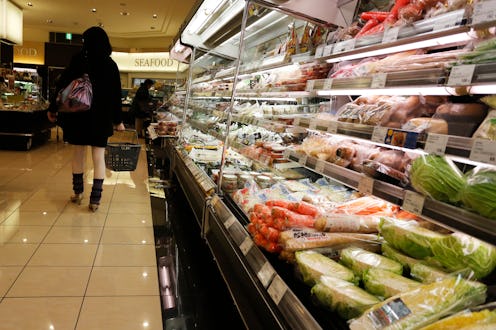Life
Lyft Is Launching A Program To Help People In D.C. Food Deserts Get Groceries

Eating fresh fruits and vegetables can be exceptionally challenging when you live in a food desert — aka, an area where access to fresh food isn't readily available. But Lyft's new Grocery Access Program aims to help families in the Washington, D.C., area gain better access to the area’s food ecosystem, the company announced in a blog post. Launching in January 2019, the program will provide local families with $2.50 Lyft Shared rides to area grocery stores during a six-month pilot period, according to Lyft. The program is in partnership with area non-profit Martha’s Table, says Lyft, and the goal is to improve the lives of people living in a known food desert in the Washington, D.C., area.
A food desert is a geographic area where people have limited access to fresh fruits and vegetables, according to the D.C. Policy Center. In a food desert, the walking distance to a grocery store is typically more than half a mile, more than 40 percent of households have no access to transportation, and the median household income is less than 185 percent of the federal poverty level for a family of four, which was about $44,995 in 2015, says the D.C. Policy Center.
Half a mile might not seem like that far, but imagine not having any access to transportation to and from the grocery store, especially in rain or snow. Now imagine trying to carry your usual load of groceries a half a mile. Now what if you live with a disability that makes walking or carrying things difficult? Access to those groceries just got even harder.
Lyft is trying to make that access just a little bit easier. According to Lyft, there are only three grocery stores serving 150,000 residents in Wards 7 and 8, which are the areas of Washington, D.C., where the company is launching the Grocery Access Program. That means 81 percent of those residents are living in a food desert, according to Lyft. Those residents need to travel further than residents in other wards to access full-service grocery stores, says Lyft, increasing their transportation costs.
To help these families access more food options, Lyft has partnered with local non-profit Martha’s Table to offer 500 families 50 rides at a flat $2.50 rate between Jan. 1 and June 30, 2019, to and from the three area grocery stores and Martha’s Table, according to Lyft. The families must have a child enrolled at one of seven participating elementary schools or Martha’s Table programming to qualify, says Lyft.
“We wanted to find a way for residents to have reliable access to fresh and healthy options for their family by reducing the time, transportation barriers, and the financial burden that comes with grocery shopping in these neighborhoods,” Steve Taylor, Lyft’s Mid-Atlantic general manager, told MarketWatch’s Moneyish.
Lyft doesn’t say whether there are any plans to roll the program out nationally, but Taylor hinted that there might be plans to expand within the D.C. area. “We think this is just the beginning, and we hope to continue to engage in D.C.’s food ecosystem beyond this pilot program,” Taylor told MarketWatch’s Moneyish.
The Washington, D.C., area certainly isn’t the only place in the United States with food deserts, so it would be wonderful to see more resources dedicated to ending the burden of food deserts, whether that's increasing access to transportation or building more grocery stores. Everyone should have the same access to fresh fruits and vegetables, no matter where they live.